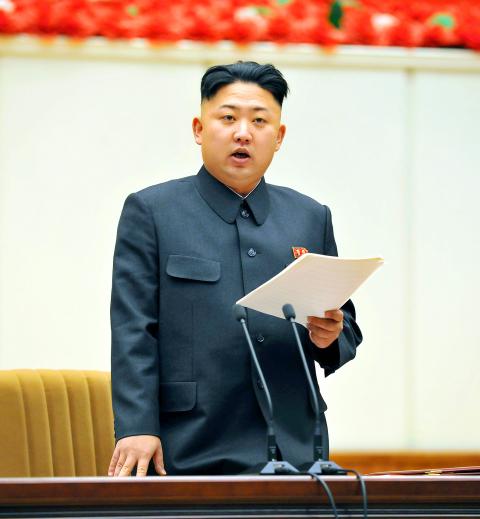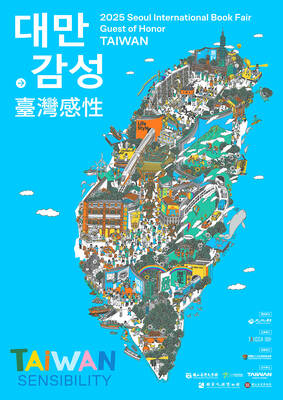North Korea has finally responded to persistent rumors that leader Kim Jong-un had plastic surgery to look like his revered grandfather, issuing an angry denial criticizing “sordid” media reports.
Speculation that Kim’s resemblance to the country’s founding leader, Kim Il-sung, is not 100 percent natural has been around for some time, though with little or no supporting evidence.
The rumors have been partly fed by the undeniable fact that Kim Jong-un has sought to evoke memories of his grandfather in numerous ways, through his dress, haircut, gestures and public appearances. There is also a clear physical resemblance, but Pyongyang’s patience with reports of plastic surgery appears to have run out.

Photo: Reuters
照片:路透
“The false report ... released by enemies is a hideous criminal act which the party, state, army and people can never tolerate,” the official Korean Central News Agency (KCNA) said in a commentary on Jan. 23.
Insisting that the very idea of Kim undergoing plastic surgery was “unimaginable,” KCNA flatly rejected what it described as “sordid hackwork by rubbish media.”
(AFP)
傳聞北韓領導人為了讓自己更像他尊敬的祖父,動過整形手術,北韓終於憤怒地否認,批評媒體報導「卑鄙」。
傳聞金正恩與北韓建國領導人金日成神似的外貌,並非百分百渾然天成,這段傳聞已有一段時日,儘管證據很少或根本付之闕如。
但金正恩以服裝、髮型、手勢等不同方式,試圖要讓民眾想起他的祖父,卻是不爭的事實,且更助長傳聞。而且,兩人外貌的確明顯相似。不過,平壤當局容忍整形報導的耐性似已消磨殆盡。
北韓官方中央通信社一月二十三日在評論中表示:「敵人公布的不實報導是醜惡的犯罪行為,北韓黨政軍及人民絕對無法容忍。」
北韓中央通信社堅稱,金正恩接受整形手術的想法「難以想像」,對其所謂「垃圾媒體的卑鄙報導」斷然駁斥。
(法新社/翻譯:陳維真)

The 2025 Seoul International Book Fair was held from June 18 to 22 at the COEX Convention & Exhibition Center in Seoul, South Korea. This year, participants from 17 countries attended, with over 530 publishing houses and related organizations taking part. For the first time, Taiwan participated in the book fair as the Guest of Honor, bringing together more than 85 publishers and presenting a curated selection of 550 titles. A delegation of 23 Taiwanese creatives traveled to Seoul to attend the event, including 13 literary authors, six illustrators, and four comic book artists, among which were a film director, an

The new generation born between 2025 and 2039 has been officially named “Generation Beta,” or simply “Gen Beta.” This generation will be the first to experience a world where artificial intelligence (AI) plays a key role in daily life. Generations are defined by shared cultural, social and historical experiences within a specific time frame. These experiences, often influenced by significant events and technological advancements, shape the values, attitudes and behaviors of each generation. The concept of generations helps us understand how different age groups interact with their environment and contribute to societal changes over time. The previous generational transition from Gen

In late 2024, the suicide of acclaimed Taiwanese author Chiung Yao at 86 sparked a societal debate. She expressed her desire to avoid the difficult aging process and sought to govern her own death rather than leave it to fate. Her statements propelled the issue of “euthanasia” back into the public arena, posing the question of whether Taiwan should legalize euthanasia to grant patients and the elderly the right to die with dignity. Euthanasia, the intentional ending of a life to relieve suffering, is legal for humans in countries like the Netherlands and Belgium but remains prohibited in Taiwan.

Continued from yesterday(延續自昨日) https://www.taipeitimes.com/News/lang As Gen Beta grows, they are expected to witness advanced technologies becoming fully integrated into various fields like education, workplaces, healthcare and entertainment. In addition to technological developments, they will also face big challenges like severe climate change. Influenced by their Gen Y or Gen Z parents, who view climate change as a critical issue for the future and prioritize sustainability, they are likely to focus more on global issues and seek innovative solutions to address them. Moreover, Gen Beta will experience considerable demographic changes, such as lower birth rates and longer lifespans. Consequently, Gen Beta is predicted to